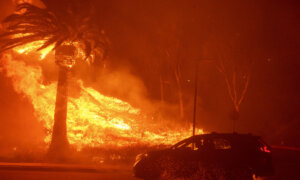Brittany Furlan, the wife of Motley Crue drummer Tommy Lee, has issued a warning to fellow pet owners after her dog was nearly dragged away by a coyote in the backyard of the couple’s Southern California home.
“Please be very careful with your dogs. I’ve lived here for four years and I’ve never seen one coyote and then today this happened. They are desperate,” the 38-year-old actress shared via Instagram on Sept. 24.
Furlan said the terrifying incident took place at approximately 1 p.m. on Tuesday after she had let her dogs out for a few moments.
“I was watching them and a coyote came and grabbed Neena in broad daylight,” she wrote.
The comedian, who wed Lee in 2019, shared Ring camera footage of the attack alongside her message.
In the video, a coyote can be seen running out onto the couple’s concrete pool deck and latching onto the 10-year-old long-haired dachshund. The coyote attempts to run away with the dog dangling from its mouth as Furlan lets out a blood-curdling scream and quickly gives chase.
“Neena is safe,” Furlan reassured her followers after the frightening ordeal.
“I climbed up the wall and grabbed her out of its mouth. Thank God she’s a little bit fat because he couldn’t make it over the wall with her. If it was teenie she would’ve been gone,” the internet personality said.
Furlan went on to reiterate that wild coyotes were increasingly exhibiting signs of desperation.
“They are getting more brazen and hungry,” she wrote. “Please be safe. I’m not even letting the dogs out anymore. This is ridiculous. Hug your babies extra tight.”
In a subsequent Instagram post, Furlan thanked her fans and followers for their concern and well wishes for Neena.
“She’s okay, guys. Thank you so much to everyone who wrote in—clearly, she’s doing fine,” the comedian remarked as Neena nibbled on a box of dog treats that had been gifted to her by a neighbor.
“It was a scary day,” Furlan added. “But this just makes us all be more aware.”
Coyote Encounters
The California Department of Fish and Wildlife (CDFW) reports that interactions with wildlife, such as coyotes, have become more prevalent in recent years, primarily as a result of human encroachment on the animals’ natural habitats.However, according to Tim Daly, an information officer with the CDFW, coyote attacks are still rare.
“Attacks aren’t necessarily becoming more frequent,” he told The Epoch Times via email.
“Instead, reporting of incidents is likely on the rise (as it is with other wildlife incidents and sightings around the state),” he said.
“CDFW has noticed a substantial increase in reports of wildlife activity since the start of Covid (when more people were home), and with the increase of home camera systems shooting activity.”
Daly also noted that the CDFW has bolstered its communication with the public through the department’s Wildlife Incident Reporting system, which enables residents to report a variety of wildlife encounters, ranging from sightings to instances of property damage.

A coyote walks through the sand dunes in Pebble Beach, Calif., on Feb. 11, 2010. (Ezra Shaw/Getty Images)
On its website, the CDFW indicates that coyotes are beneficial to their ecosystems because they help manage populations of rodents and other small mammals in urban areas.
Nevertheless, the state agency warns that the canine species are opportunistic omnivores, capable of consuming almost anything available to them, such as rabbits, birds, reptiles, fruits, plants, human food, and even pets.
For this reason, Daly highlighted the importance of implementing precautions to help minimize the chances of coming into contact with a coyote.
“First and most importantly, reduce the things in our yards and communities that attract wildlife in the first place; food, water, and shelter,” he said.
“Don’t leave out pet food at night, don’t let birdfeeders spill seed onto the ground, pick up fallen fruit, clean barbecues, reduce overgrown brushy shelter in our landscaping,” Daly said.
“Keep a close eye on pets outdoors at night. Keep children close if out on walks or hikes,” he said. “Be large and loud when encountering wildlife. Don’t turn and run.”














